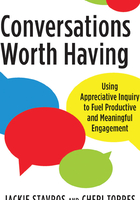
The Appreciative–Depreciative Dimension
The first dimension describes the nature of our conversations as either appreciative (adding value) or depreciative (devaluing). Adding value to a situation, person, or opportunity can show up in a number of ways: sharing ideas, augmenting other people’s contributions, naming important factors, advocating for possible actions, acknowledging other people’s contributions, suggesting possibilities, pointing out opportunities, responding to questions with new perspectives, and contributing to planning—these are all appreciative ways we add value through conversations.
Engaging in such ways strengthens connections, enhances relationships, expands awareness, broadens and builds human potential, adds new knowledge, or moves us toward desired outcomes. Think about times you’ve collaborated with others to develop creative solutions to a sticky problem or been publicly acknowledged for great work you’ve done. Remember how these conversations made you feel? Often conversations like these feel good and are energizing. The value-added goes beyond the positive emotions we experience. These conversations literally create an upward spiral of confidence and optimism.
Think about times you’ve collaborated with others to develop creative solutions to a sticky problem or been publicly acknowledged for great work you’ve done. Remember how these conversations made you feel? Often conversations like these feel good and are energizing. The value-added goes beyond the positive emotions we experience. These conversations literally create an upward spiral of confidence and optimism. They stimulate meaningful engagement and inspire positive action.
They stimulate meaningful engagement and inspire positive action.
By contrast, the depreciative dimension devalues a situation, person, or opportunity. This shows up in conversations when someone belittles other people’s ideas, criticizes others’ contributions, advocates for their own ideas without listening to others, continually points out reasons why things will not work, drives a singular focus, dominates the interactions without making room for others to speak, interrupts or cuts people off, ignores contributions, and complains. Engaging in ways that devalue others actually weakens connections, strains relationships, reinforces assumptions, eclipses human potential, limits possibility, and hinders movement toward desired outcomes. Think back on times you may have argued with someone you cared about or have been on the receiving end of criticism. Did you say things you didn’t mean or came to regret later? How did those conversations make you feel?
Depreciative conversations are often described as exhausting and can leave people with low energy, feeling alienated and drained. Research in the field of positive psychology has found that focusing on what is wrong or the negative in an effort to fix something actually narrows our thought repertoire, thereby restricting access to the skills and thinking capacity needed for creativity, critical thinking, and solution-finding. Depreciative conversations can smother creativity, resulting in decreased productivity and disengagement.
Depreciative conversations can smother creativity, resulting in decreased productivity and disengagement.